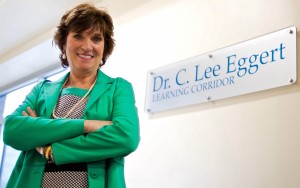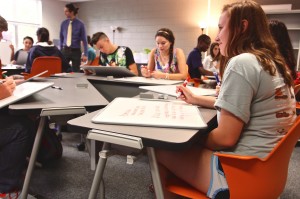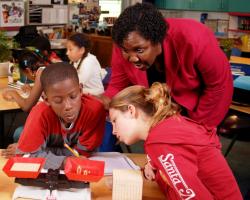School names corridor after former principal to honor daughter’s gift
 Leslie Eggert Scales-Holloway (BAE ’68) was visibly moved as she reflected on her late father’s role as the beloved principal at P.K. Yonge Developmental Research School from 1947 to 1952. “He strongly believed in the connection between school and community,” she said in a recent interview. “That was Daddy.”
Leslie Eggert Scales-Holloway (BAE ’68) was visibly moved as she reflected on her late father’s role as the beloved principal at P.K. Yonge Developmental Research School from 1947 to 1952. “He strongly believed in the connection between school and community,” she said in a recent interview. “That was Daddy.”
Scales-Holloway of Orlando, and a P.K. Yonge “lifer” (attending kindergarten through high school there), has pledged a $100,000 gift in support of the school’s proposed state-of-the-art secondary building. Like P.K. Yonge’s ultramodern elementary building, which opened in 2012, the 21st century design of the secondary building will “transform the educational experience for today’s and tomorrow’s students,” according to school Director Lynda Hayes.
While the secondary building project is still in the fundraising stage before construction can start, school officials have honored Scales-Holloway for her generosity by naming a key portion of the new elementary wing as the Dr. C. Lee Eggert Learning Corridor, in honor of her father, the former principal.
“The (learning corridor) space is flexible and can be used in so many different ways. Daddy would have loved this space and seeing the potential for a wide variety of learning activities and community events taking place here,” Scales-Holloway said.
After Dr. Eggert’s time at P.K. Yonge, which has served as UF’s K-12 laboratory school since 1934, he joined the faculty at the UF College of Education where he was a professor of secondary administration. His work with the Florida Parent-Teacher Association and chairmanship of the Florida Association of Colleges and Secondary Schools endeared him to students, parents, teachers and administrators statewide.
After graduating from P.K. Yonge, Scales-Holloway went on to earn her bachelor’s degree in education in 1968 from the UF College of Education. She taught school in Alachua and Marion counties and served for several years as a member of the Marion County School Board.
She was recently joined in celebrating the naming of the Dr. C. Lee Eggert Learning Corridor by her husband Rufus (who also goes by “Dick”), three siblings (also P.K. Yonge “lifers”), extended family, P.K. Yonge faculty and staff.
The prevailing sentiment at the school may best be summed up in the words of Ashley Pennypacker-Hill, P.K. Yonge program and outreach specialist and a P.K. Yonge alumna (class of ‘99): “We are delighted that this beautiful space will now remind us of P.K. Yonge’s past and will continue to support P.K. Yonge’s future.”

 Inspired by the early impact of P.K. Yonge Developmental Research School’s new, state-of-the-art elementary wing, faculty researchers from PKY and the University of Florida are teaming up on pioneering studies into how school building design can influence and improve schooling for both teachers and students.
Inspired by the early impact of P.K. Yonge Developmental Research School’s new, state-of-the-art elementary wing, faculty researchers from PKY and the University of Florida are teaming up on pioneering studies into how school building design can influence and improve schooling for both teachers and students.



